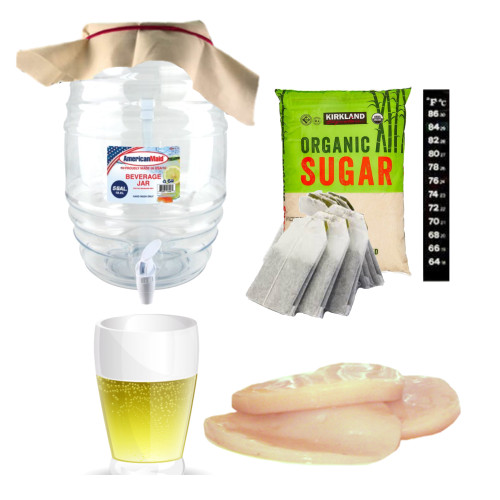Description
Elderberry 8 ounces dry herb. $8.95. Whole berries wildcrafted.
An in vitro study of elderberry extract and H1N1 flu infection identified the antiviral components of elderberry and established that elderberry flavonoids bind to H1N1 viruses and, when bound, block the ability of the viruses to infect host cells. The researchers concluded that the H1N1 inhibition activities of the elderberry flavonoids compare favorably to Tamiflu and Amantadine (Roschek et al., 2009).
Dose Decoction: 1-1.5 g dried berry/day divided into 1-3 doses; Tincture: 4-6 mL (1:2, 25%) 4-6x/day (Kuhn & Winston, 2008).
Use one ounce of the dried herb per gallon for a refreshing light flavorful taste. Use more per your personal preference.
For a added sugar -free Kombucha Tea - juice the elderberries by first steaming or high boil, then crush and drain. Substitute the juice (which has fructose) for the traditional white sugar. Use a Hydrometer to measure the sugar level. By tradition one cup aod sugar per 3 quarts of water measures 1.020 Specific Gravity.
details about our Organic Kombucha Mushroom Starter Culture
ElderBerry. Produces elderberry wine, jelly and great Kombucha Tea. Elder Fruit's ability to promote urination has made it a traditional remedy for fever, colds and flu. respiratory infections antioxidants. In addition, Elder Fruit can be used to treat chronic rheumatism, neuralgia, sciatica. Elder is an effective detoxifier and can be used topically to clear infections such as acne, boils, and skin rashes.
Elderberries were called the "medicine chest of the common people" by the American Indians.
Nutrition values:
Vitamin A: 600 I.U. per 100 gm.
Vitamin B: Thiamine 0.07 mg.:
Riboflavin 0.06 mg : Niacin 0.5 mg.
Vitamin C: 36mg.
Protein: 2.6 gm
Calories: 72
Fat: 0.5 gm.
Carbohydrates: 16.4 gm.
Calcium: 38 gm.
Iron: 1.6 mg.
Phosphorus: 28 mg.
Suggested usage
Therapeutic actions of the elder plant include:
An astringent, immuno-stimulant, emetic, expectorant, diaphoretic, laxative, diuretic, sedative, and anti-inflammatory.
Elder is an excellent blood cleanser (it helps eliminate waste in the fluid surrounding the blood cells).
Elder flowers contain 3 rich sources of potassium plus viburnic acid (helpful for asthma an bronchitis), volatile oils, vitamin A, vitamin C. and bioflavonoids. Elderberry jam/jelly contains many vitamins and minerals, particularly vitamin B17. In fact, elderberries contain more vitamin C than any other herb except for black currants and rosehips!
Research indicates that elderberries stimulate and build up the resistance of the immune system, and it also directly inhibits the influenza virus. Elderberries have an enzyme that smoothes down the pointed spikes on the outside of the virus, which it uses to pierce through the cell walls.
How does it work?
Elderberry might affect the immune system. Elderberry seems to have activity against viruses including the flu, and might reduce inflammation. strengthens the immune system
Serve it Hot for: Colds, sore throat, fever and flu.
Serve it Cold for: spring tonics, blood purifiers and diuretics.
A recent review of randomized controlled trials and case-control studies of the incidence of respiratory infections or symptoms available on MEDLINE, Web of Science, Cochrane Library and Embase including 33 studies stated: "When the risk of bias and repetition is taken into account, probiotics and elderberry repeatedly show favorable effects."[22]
Coronavirus disease 2019 (COVID-19): While elderberry may have some benefit for the common cold and flu, there is no good evidence to support using it for COVID-19. Follow healthy lifestyle choices and proven prevention methods instead.
Great for making wine and jellies follow traditional recipes.
For kombucha brewing We recommend to add 25-50% elderberries to regular tea (Camellia Sinensis) and seep to desired strength. The combination helps maintain the kombucha strain. Add a few berries just prior to bottling to increase the flavor and increase the sugar content for a secondary ferment.
As a comparison about 15 pounds of common grapes are used to make one gallon of wine, and only 2 to 4 pounds of Elderberries are necessary for each gallon of Elderberry wine while only 3 ounces of Elderberries make one gallon of delicious Kombucha Elderberry Tea.
Kombucha Elderberry Second Ferment
1. Ratio: One teaspoon dried (washed) elderberries per cup (8 fluid ounces) of Kombucha Tea
option: Rinse elderberries. Cover with water and heat in a double boiler. Add juice / berries to Kombucha Tea
option: Rinse and juice elderberries. Add strained juice to Kombucha Tea.
option: add sugar if needed. If your Kombucha Tea is sweet, no need to add. If sour add 1/2 teaspoon of sugar.
2. Use an Airlock, plastic body (for safety) or Glass with a tight fitting lid - be mindful of glass exploding.
Mix and shake elderberries, Kombucha Tea and sugar to mix and oxygenate and add carbonation.
3. Culture in a warm space. Recommend 74F - 84F. The longer you allow to ferment the greater the carbonation. The greater the carbonation the greater the alcohol. When using plastic soda bottles you can feel the pressure build up. You can determine the sugar and alcohol level via a Hydrometer
4. When you determine its ready, place in the refrigerator. The Cold helps smooth out some of the harshness of a ferment plus moves the carbonation (CO2) back into the liquid.
5. Open carefully. Don't shake. Better to open over the sink. Strain if needed.
Additional Details
- SKU:
- Elderberry-8oz optional KS












